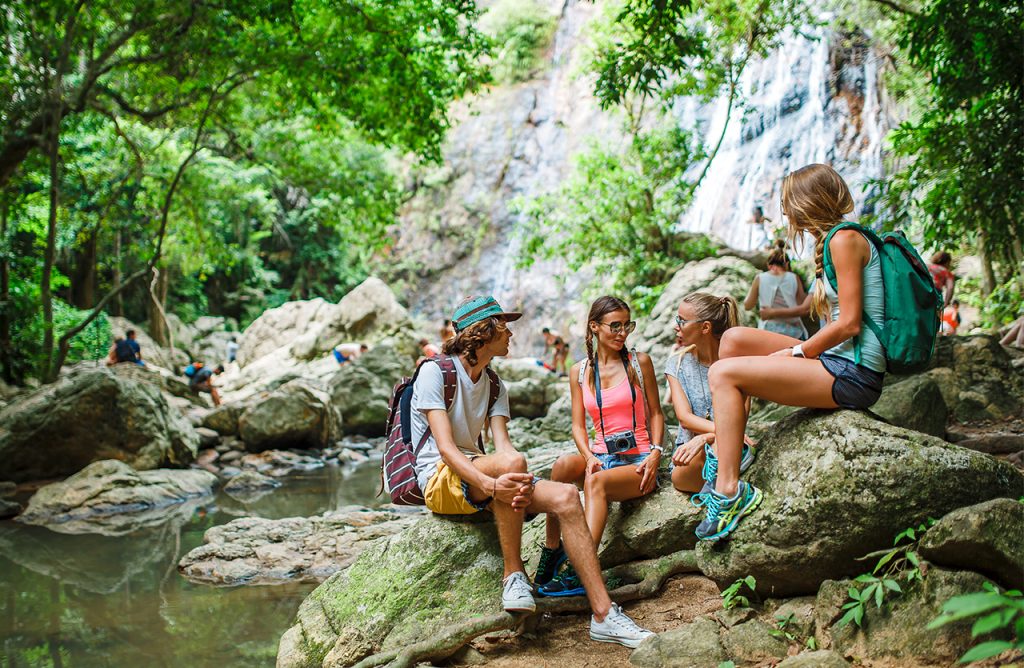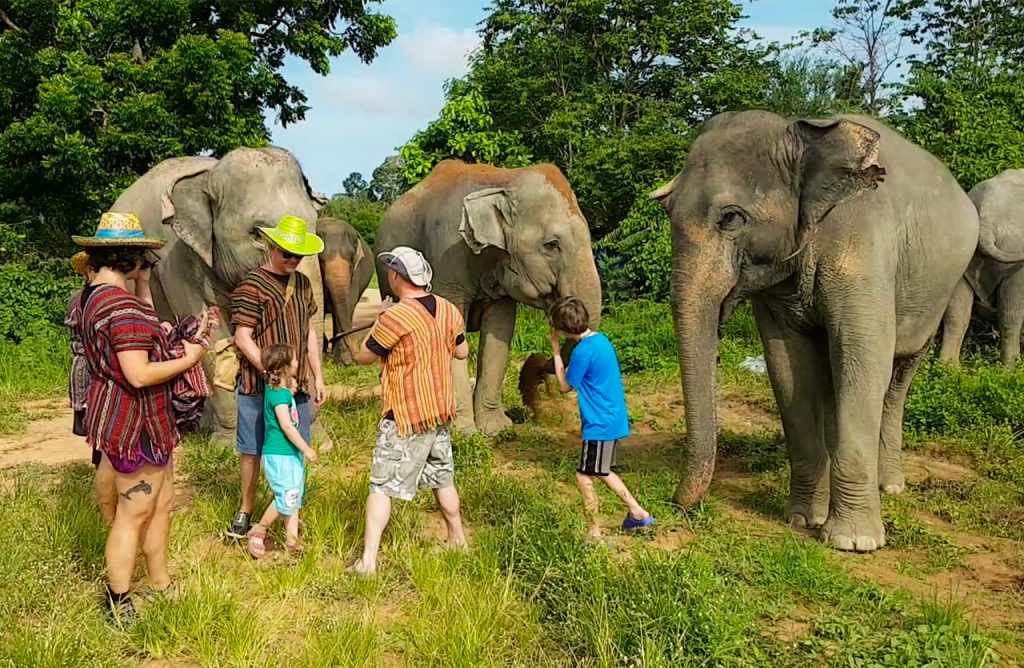

5 Tips for Thai Animal Tourism
From elephants and tigers to dolphins, turtles and whales, Thailand offers some of the most amazing wildlife the world has to offer. However, tourism and the natural world don’t always mix. In this article, we provide some practical tips for travellers in Thailand. Our goal is to provide unique, sustainable and respectful encounters that showcase Thailand’s magical biodiversity, while also helping to preserve the dignity and wellbeing of those animals visitors have come so far to see.
Animal tourism in Thailand:
The Lands of Smiles is making progress with its treatment of animals, but there is still work to do. Popular tourism hot spots like Chiang Mai, Phuket and Pattaya are known to have monkey and snake shows, dolphin attractions and elephant riding, while the busy streets of Bangkok are an urban jungle that’s home to its own population of animal captives. Here you might see monkeys, loris, snakes, crocodiles, birds and even elephants
Animal tourism in Thailand can be problematic. For travellers who want to be part of the solution, check out our top five tips for animal welfare:

1. Look for The Five Freedoms
Each living creature has a different set of needs and requires a unique approach. However, certain basic guidelines to animal welfare are relevant for all species. The Five Freedoms can act as a useful baseline guide for animal welfare, regardless of species or location. According to these guidelines, all animals in captivity have a right to the following:
- 1. Freedom from hunger and thirst
- 2. Freedom from discomfort
- 3. Freedom from pain, injury or disease
- 4. Freedom to express normal behaviour
- 5. Freedom from fear and distress
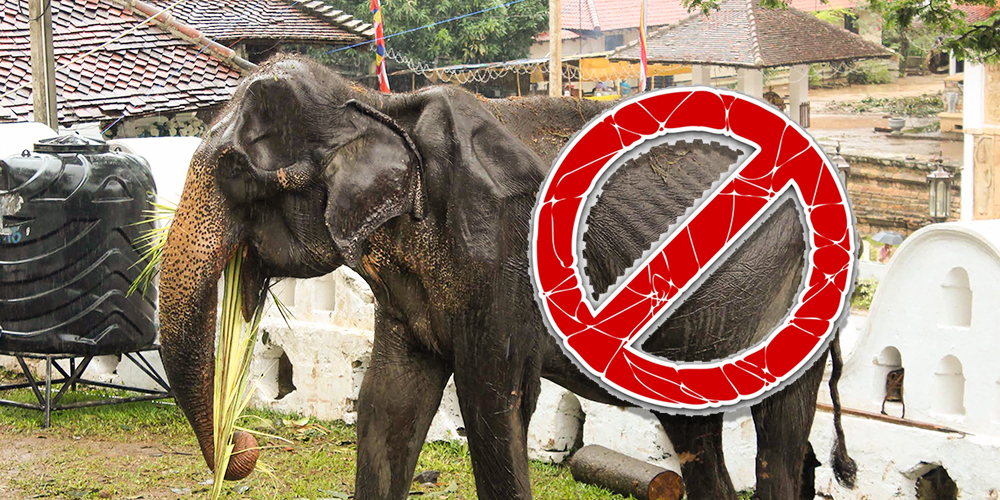
1. Look for The Five Freedoms
Each living creature has a different set of needs and requires a unique approach. However, certain basic guidelines to animal welfare are relevant for all species. The Five Freedoms can act as a useful baseline guide for animal welfare, regardless of species or location. According to these guidelines, all animals in captivity have a right to the following:
- 1. Freedom from hunger and thirst
- 2. Freedom from discomfort
- 3. Freedom from pain, injury or disease
- 4. Freedom to express normal behaviour
- 5. Freedom from fear and distress

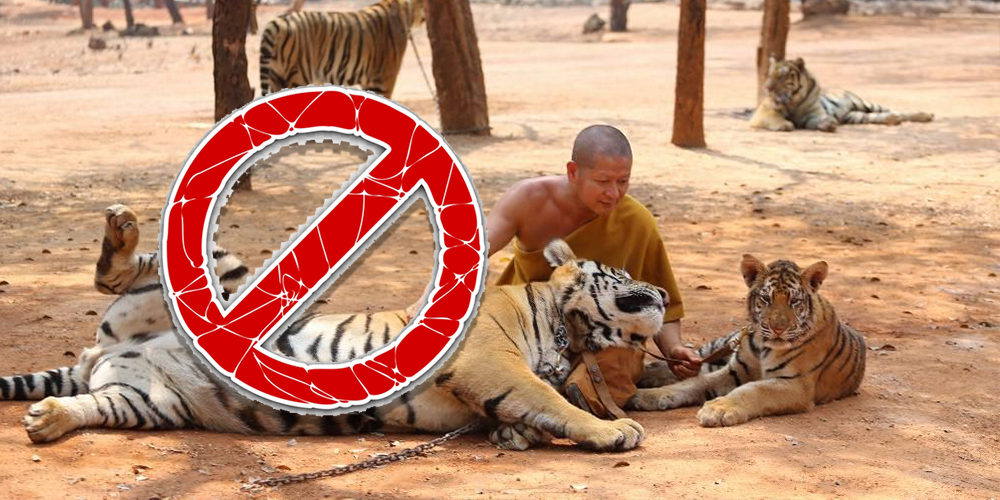
2. Don’t pose for photographs with tigers
This old school animal tourism scam just won’t go extinct. Tigers are apex predators that could easily make a meal of the average tourist, so ask yourself: why would this animal willingly put its head in my lap for a photo? The answer, invariably, is that they have been drugged, beaten or trained through torture to exhibit unnatural behaviours. Whether in zoos, parks or dedicated ‘tiger temples’, the conditions these animals live under are usually deplorable, and their lives in the public eye are degrading. Don’t support this exploitation of tigers on your travels.
2. Don’t pose for photographs with tigers
This old school animal tourism scam just won’t go extinct. Tigers are apex predators that could easily make a meal of the average tourist, so ask yourself: why would this animal willingly put its head in my lap for a photo? The answer, invariably, is that they have been drugged, beaten or trained through torture to exhibit unnatural behaviours. Whether in zoos, parks or dedicated ‘tiger temples’, the conditions these animals live under are usually deplorable, and their lives in the public eye are degrading. Don’t support this exploitation of tigers on your travels.

3. Do your research on elephant rides and shows
This is a contentious issue in Thailand; while some insist that elephants should never be ridden or interacted with, others believe these domesticated animals are too integrated with people to be treated as wild. The solution probably lies somewhere in the middle; the best we can do for elephants is to push for improvements in the standards and practices that govern their lives in captivity; Panorama Destination Thailand prefers to work with elephant providers to raise their standards, rather than campaigning against them. That being said, you should never support any begging, entertainment or activity that exploits elephants with unnatural behaviour. For elephant rides, the industry consensus right now is that they should be permitted, but with certain essential guidelines in place to ensure the welfare of the animals involved.
Further reading: elephant standards
The Asian Captive Elephant Working Group (ACEWG) provides a set of standards and criteria as guidelines and references for elephant camps, while Asian Captive Elephants Standards (ACES) has also created best practices and standards of welfare, living, and working conditions for all elephants engaged in tourism. ACES works alongside camps, governments, mahouts, universities and local communities to ensure all captive elephants are provided with the best care and conservation outcomes possible.
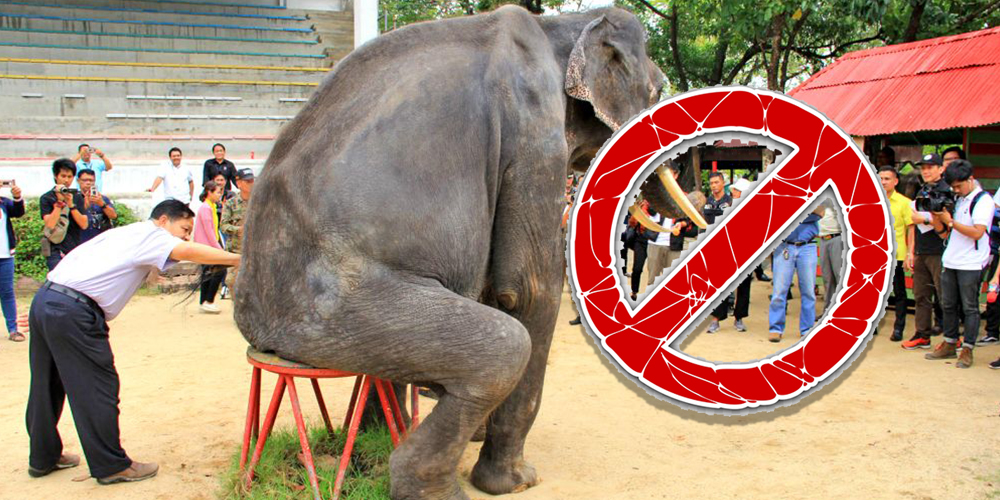
3. Do your research on elephant rides and shows
This is a contentious issue in Thailand; while some insist that elephants should never be ridden or interacted with, others believe these domesticated animals are too integrated with people to be treated as wild. The solution probably lies somewhere in the middle; the best we can do for elephants is to push for improvements in the standards and practices that govern their lives in captivity; Panorama Destination Thailand prefers to work with elephant providers to raise their standards, rather than campaigning against them. That being said, you should never support any begging, entertainment or activity that exploits elephants with unnatural behaviour. For elephant rides, the industry consensus right now is that they should be permitted, but with certain essential guidelines in place to ensure the welfare of the animals involved.
Further reading: elephant standards
The Asian Captive Elephant Working Group (ACEWG) provides a set of standards and criteria as guidelines and references for elephant camps, while Asian Captive Elephants Standards (ACES) has also created best practices and standards of welfare, living, and working conditions for all elephants engaged in tourism. ACES works alongside camps, governments, mahouts, universities and local communities to ensure all captive elephants are provided with the best care and conservation outcomes possible.

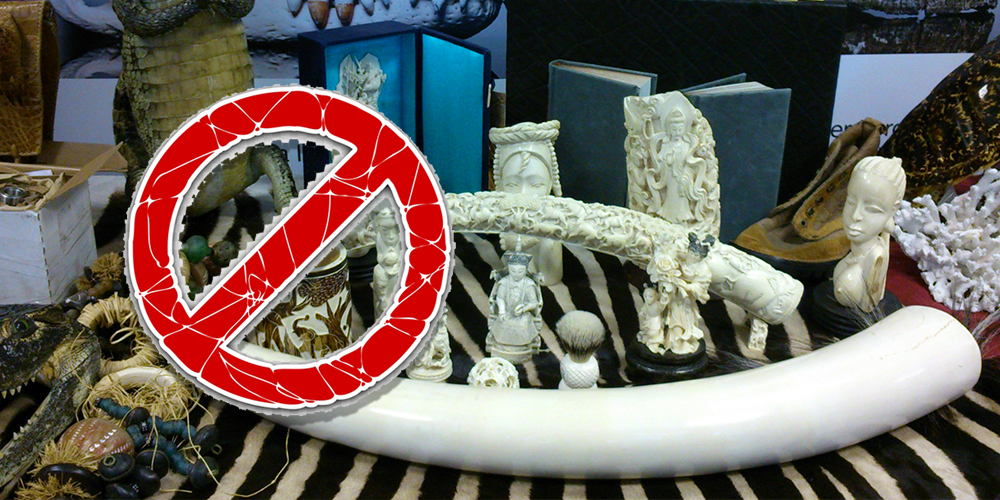
4. Don’t buy animal products or souvenirs
Ok, so this is an easy one. DON’T buy animal souvenirs in Thailand. Depending on where you go, you’re likely to be offered any combination of coral ornaments, ivory trinkets, shark teeth, snake or tiger wine, bush meat and other animal products – even the animals themselves! The answer is simple: just say NO. When the buying stops, the killing stops too.
4. Don’t buy animal products or souvenirs
Ok, so this is an easy one. DON’T buy animal souvenirs in Thailand. Depending on where you go, you’re likely to be offered any combination of coral ornaments, ivory trinkets, shark teeth, snake or tiger wine, bush meat and other animal products – even the animals themselves! The answer is simple: just say NO. When the buying stops, the killing stops too.

5. If you see animal cruelty, report it
At Panorama Destination, we are dedicated to animal welfare and continually strive to improve our services and raise industry-wide standards, to ensure animals in Thailand are respected, protected and cherished. We support positive change that can help achieve this aim, so if you see any violations on your travels, please report them to us. We can then take the necessary action to protect the animals involved and, if necessary, help bring offenders to justice.
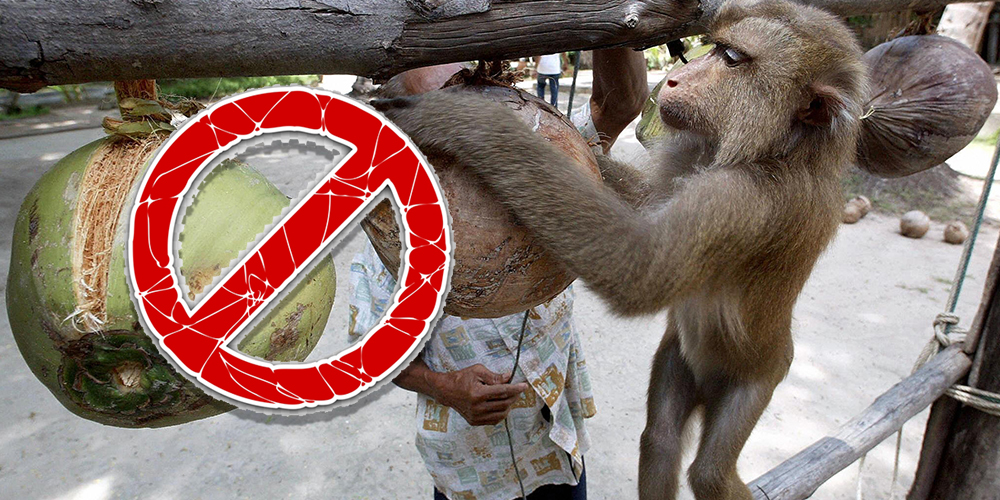
5. If you see animal cruelty, report it
At Panorama Destination, we are dedicated to animal welfare and continually strive to improve our services and raise industry-wide standards, to ensure animals in Thailand are respected, protected and cherished. We support positive change that can help achieve this aim, so if you see any violations on your travels, please report them to us. We can then take the necessary action to protect the animals involved and, if necessary, help bring offenders to justice.


Whether captive or in the wild, the welfare of animals must take priority over entertainment or enjoyment at their expense. Travellers in Thailand want memorable wildlife experiences, but they also expect high animal welfare standards. Panorama Destination is working to ensure that all tours and services provide both.
For a tailor-made tour that combines eco-friendly elephant encounters with a visit to one of Thailand’s most fascinating tribes, check out our Chiang Mai and Mae Tang Trek.
Recommended Partner:
Panorama Destination Thailand works closely with Wildlife Friends Foundation Thailand (WFFT); a registered NGO that’s provides rescue, rehabilitation and veterinary care for animals in Thailand. WFFT also offers educational initiatives to local Thai people and tourists at their Elephant refuge, lodge and rescue centre. WFFT responds to reports by the public about wildlife in need of protection – from the illegal pet trade, poachers or exploitative tourism businesses. For more information about volunteering, donations and daytrips, check out their website.
Whether captive or in the wild, the welfare of animals must take priority over entertainment or enjoyment at their expense. Travellers in Thailand want memorable wildlife experiences, but they also expect high animal welfare standards. Panorama Destination is working to ensure that all tours and services provide both.
For a tailor-made tour that combines eco-friendly elephant encounters with a visit to one of Thailand’s most fascinating tribes, check out our Chiang Mai and Mae Tang Trek.
Recommended Partner:
Panorama Destination Thailand works closely with Wildlife Friends Foundation Thailand (WFFT); a registered NGO that’s provides rescue, rehabilitation and veterinary care for animals in Thailand. WFFT also offers educational initiatives to local Thai people and tourists at their Elephant refuge, lodge and rescue centre. WFFT responds to reports by the public about wildlife in need of protection – from the illegal pet trade, poachers or exploitative tourism businesses. For more information about volunteering, donations and daytrips, check out their website.

Beyond Covid: 5 Tips For Safer Travel
18th November 2020
With borders reopening, travel restrictions being lifted and new visas now available, we can finally begin planning those long-awaited holidays in Thailand! After so long in lockdown, many travellers are nervous about heading abroad and want to know how they can stay safe. […]
READ MOREThailand: Top Picks
21st October 2020
Looking forward to a little summer sun after months of lockdown? With Covid-19 restrictions finally being lifted and flights returning to Thailand, now is the time to start planning ahead for that long-awaited and much-anticipated getaway. If you’re wondering where to begin, Panorama […]
READ MORE5 Tips For Thai Animal Tourism
23rd September 2020
From elephants and tigers to dolphins, turtles and whales, Thailand offers some of the most amazing wildlife the world has to offer. However, tourism and the natural world don’t always mix. In this article, we provide some practical tips for travellers in Thailand. Our goal is to provide unique, […]
READ MORECommon Problems & Solutions
10th February 2020
Travelling in Thailand is an unforgettable experience; the majority of visitors to the Land of Smiles leave with only positive stories to tell. However, as with all travel in far-flung places, things can occasionally go wrong. To ensure you remember […]
READ MOREUnesco City Of Gastronomy – Phuket Town
5th July 2019
Phuket Town is known for many things: historical architecture, spectacular beaches and vibrant nightlife. But one thing that keeps visitors coming back for more is the food; with an amazing array of local delicacies, there’s something here to satisfy every […]
READ MOREThailand Do’s And Don’ts
26th April 2019
When travelling in Thailand, one of the first things you’ll notice is how hospitable and friendly Thai people are in welcoming outsiders to their country. However, there are some important cultural customs to bear in mind when visiting. If you’re […]
READ MORETop 10: Beaches In Phuket
3rd September 2018
Looking for postcard-perfect beach breaks in Phuket? Thailand’s favourite island is perfectly located in the warm and tranquil waters of the Andaman Sea, and is home to some of the country’s most iconic beaches. You’ll find most of them along […]
READ MORETop 10: Street Foods In Thailand
30th November 2017
Wherever you go in Thailand, you’ll find that as soon as the sun goes down – and sometimes before – the streets fill up with tables and chairs, the fragrant air cools and thickens with cooking smoke and every available […]
READ MORETop Festivals In Thailand
17th November 2017
In Thailand, the calendar is packed with weird and wonderful events – outlandish festivals and celebrations that are the perfect excuse to party. From food festivals to rocket races, buffalo beauty pageants and underwater weddings, there’s plenty to see and […]
READ MOREBeyond Covid: 5 Tips For Safer Travel
With borders reopening, travel restrictions being lifted and new visas now available, we can finally begin planning those long-awaited holidays in Thailand! After so long in lockdown, many travellers are nervous about heading abroad and want to know how they can stay safe. […]
Thailand: Top Picks
Looking forward to a little summer sun after months of lockdown? With Covid-19 restrictions finally being lifted and flights returning to Thailand, now is the time to start planning ahead for that long-awaited and much-anticipated getaway. If you’re wondering where to begin, Panorama […]
5 Tips For Thai Animal Tourism
From elephants and tigers to dolphins, turtles and whales, Thailand offers some of the most amazing wildlife the world has to offer. However, tourism and the natural world don’t always mix. In this article, we provide some practical tips for travellers in Thailand. Our goal is to provide unique, […]
Common Problems & Solutions
Travelling in Thailand is an unforgettable experience; the majority of visitors to the Land of Smiles leave with only positive stories to tell. However, as with all travel in far-flung places, things can occasionally go wrong. To ensure you remember […]
Unesco City Of Gastronomy – Phuket Town
Phuket Town is known for many things: historical architecture, spectacular beaches and vibrant nightlife. But one thing that keeps visitors coming back for more is the food; with an amazing array of local delicacies, there’s something here to satisfy every […]
Thailand Do’s And Don’ts
When travelling in Thailand, one of the first things you’ll notice is how hospitable and friendly Thai people are in welcoming outsiders to their country. However, there are some important cultural customs to bear in mind when visiting. If you’re […]
Top 10: Beaches In Phuket
Looking for postcard-perfect beach breaks in Phuket? Thailand’s favourite island is perfectly located in the warm and tranquil waters of the Andaman Sea, and is home to some of the country’s most iconic beaches. You’ll find most of them along […]
Top 10: Street Foods In Thailand
Wherever you go in Thailand, you’ll find that as soon as the sun goes down – and sometimes before – the streets fill up with tables and chairs, the fragrant air cools and thickens with cooking smoke and every available […]
Top Festivals In Thailand
In Thailand, the calendar is packed with weird and wonderful events – outlandish festivals and celebrations that are the perfect excuse to party. From food festivals to rocket races, buffalo beauty pageants and underwater weddings, there’s plenty to see and […]


